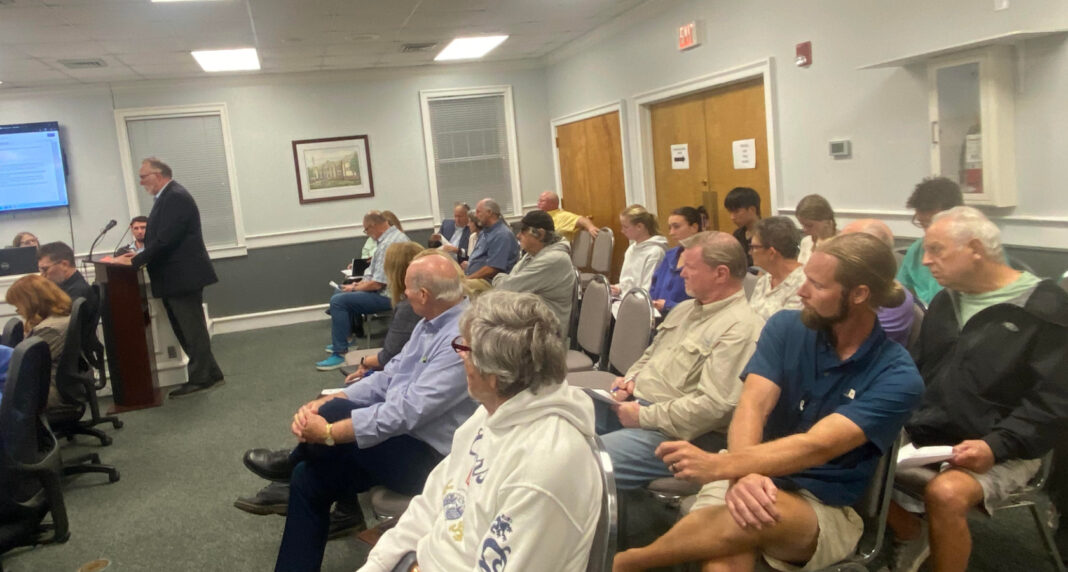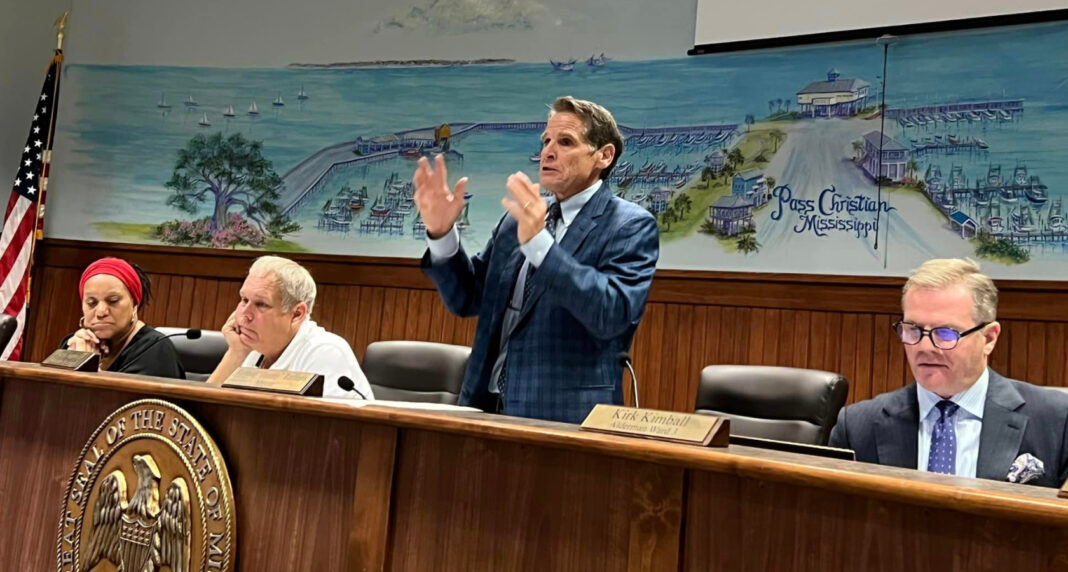OCEAN SPRINGS, MS — At first glance, it might seem like a minor issue: a city attorney advising the board of aldermen not to respond to a public commenter during a meeting. But when incidents like this happen again and again, a troubling pattern emerges — one that raises questions about whether Ocean Springs officials are respecting the Constitution or systematically silencing dissent.
Tuesday night’s Board of Aldermen meeting was the latest stage for frustration over transparency in city governance. It started when resident Michael Pfeiffer voiced concerns about the lack of clarity in how the city selects its outside legal council — and ended with the city attorney publicly advising elected officials not to address the concerns of another citizen.
Minor Incident with Major Constitutional Concerns
“Where are we gonna find out how you pick the attorney other than somebody knows somebody?” Pfeiffer asked, pointing out the absence of a bidding processes or visible criteria for contractor selection. “It boggles my mind.”
Mayor Kenny Holloway explained that while the city issues Requests for Qualifications (RFQs) for engineering services, legal services are not subject to the same process. But the tension in the room heightened when Ellen Hall, a local attorney with government procurement experience, followed up with her own request for answers. After the mayor breached the topic of engineering contracts, Hall pressed the board about her husband’s repeated, yet unanswered, public records requests for documentation of RFQs related to Cypress Engineering.
“We’re still trying to find out where the RFQ or request for proposal went out for Cypress Engineering and all the proposals that came in from the different vendors,” Hall said. “Having been in government procurement for 30 years, it’s just really strange for us to see. We would expect you to follow some kind of a process like that that we could easily see.”
As Hall finished her question, Acting City Attorney Will Norman abruptly stepped in. “Mayor, her husband is submitting a public records request. He’s threatened the ethics compliance. I would advise not to comment,” Norman said, shutting down any further discussion.
A Dangerous Pattern
This moment might seem small, but it’s part of a larger narrative unfolding in Ocean Springs — a narrative of officials dismissing public concerns, dodging accountability, and, in this case, potentially retaliating against a citizen exercising her constitutional rights.
The First Amendment guarantees every citizen the right to petition their government for redress of grievances. Filing or even threatening an ethics complaint is a protected activity, as is asking questions during a public comment period. Advising officials to ignore a public commenter, simply because of a potential ethics complaint tied to their spouse, smacks of retaliation — a chilling signal to anyone who might challenge the status quo.
Legal experts have emphasized that government retaliation against individuals for exercising their First Amendment rights can be subtle yet impactful. For instance, the American Civil Liberties Union (ACLU) has noted, “Retaliation against individuals for exercising their First Amendment rights can take many forms, not all of which are overt or explicit. Even subtle actions by government officials that deter free expression can undermine the foundations of constitutional governance.”
Similarly, the First Amendment Coalition has stated, “Government actions that may seem minor or indirect can still have a chilling effect on free speech, especially when they are in response to individuals exercising their right to petition or criticize the government.”
Tuesday’s incident is not the first time Ocean Springs officials have been accused of undermining public participation. From limiting the number of speakers during public comments to ignoring records requests, residents have consistently raised concerns about transparency and accountability. While each incident on its own may seem minor, together they paint a picture of a government that is increasingly dismissive of its citizens.
The Costs of Silence
For Ellen Hall, the unanswered questions about procurement practices aren’t just a bureaucratic nuisance — they’re a matter of public trust. “When you’re the caretaker of so much money, $25 million a year, we expect you to follow some kind of a process like that that we could easily see,” she said.
Hall’s concerns are amplified by the city’s lack of response to public records requests submitted by her husband. Public records requests are a legal mechanism that allows citizens to access government documents, promoting transparency and accountability in public administration. In Mississippi, these requests are governed by the Mississippi Public Records Act, which requires public agencies to make records available unless they fall under specific exemptions.
Hall’s husband has repeatedly requested documentation on the selection process for Cypress Engineering, specifically seeking RFQs and proposals. The city’s refusal to provide clear answers not only raises concerns about transparency but also feeds skepticism about how decisions are made. Transparency isn’t just a courtesy; it’s a legal and ethical obligation.
But beyond the financial implications lies a deeper concern: the erosion of constitutional rights. The cumulative effect of these incidents creates a chilling environment where citizens may think twice before raising their voices, filing complaints, or demanding accountability.
As Hall pressed for clarity, her involvement with SaveOS, a local advocacy group that has become a loud voice in city affairs, loomed over the exchange. The group has butted heads with city officials on multiple occasions, most notably over controversial redevelopment plans and the perceived lack of transparency in major contracts.
What’s at Stake?
This isn’t just about one public meeting or one public commenter. It’s about the kind of government Ocean Springs wants to be. A government that hides behind its attorney’s advice to avoid public accountability risks alienating the very people it serves—and violating their rights in the process.
Ellen Hall may not have gotten the answers she was seeking on Tuesday night, but her persistence and questions resonate far beyond City Hall. As more residents demand transparency and stand up for their rights, Ocean Springs faces a choice: double down on avoiding accountability or uphold the Constitution and the trust of its citizens.
The next move is theirs — and the people are watching.


